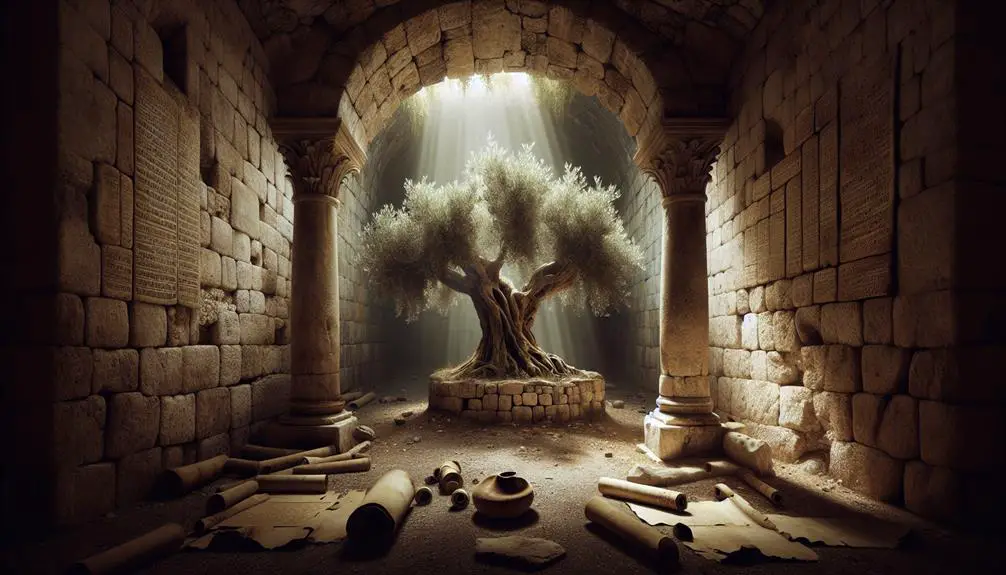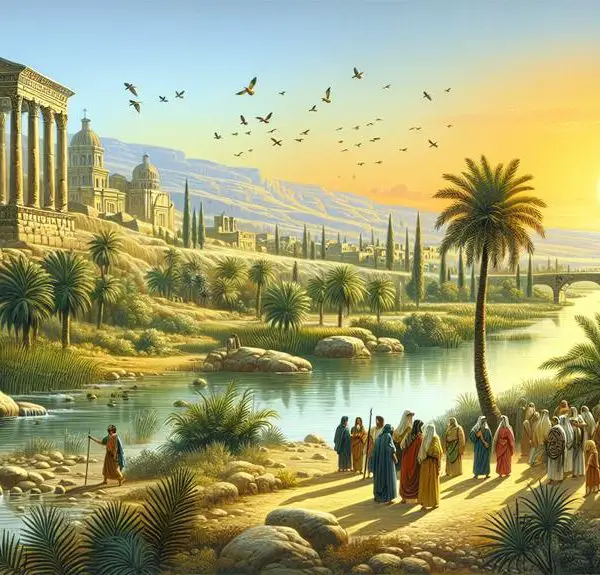Unlock the mystery of the 'Secret Place' in Psalm 91, a sanctuary of divine protection and intimate connection with God.

Secret Place in the Bible Verse
In exploring the concept of the 'Secret Place' within biblical scripture, particularly within Psalm 91, one encounters a multifaceted symbol of divine protection and intimacy with God. This notion, while deeply rooted in historical and theological contexts, offers a compelling invitation to contemporary seekers of spiritual refuge.
The phrase itself, evocative and mysterious, beckons a deeper exploration of its implications for personal faith and the collective experience of sanctity. As we examine the layers of meaning attributed to this sacred concept, we uncover not only its historical significance but also its enduring relevance for individuals seeking solace and strength in their spiritual journey.
Key Takeaways
- The "secret place" symbolizes a divine refuge and intimate connection with God, as illustrated in Psalm 91.
- It represents a spiritual journey towards inner resilience and closeness with the divine, transcending literal interpretations.
- Accessing the "secret place" involves engaging in spiritual disciplines like prayer, meditation, and reflection, fostering a deep, personal connection with God.
- Its relevance endures in the modern era, offering guidance on integrating spiritual practices into daily life to navigate contemporary challenges.
Unveiling the Secret Place

The concept of the 'secret place' in biblical scripture, often interpreted as a metaphor for divine protection and intimacy with God, warrants a comprehensive and analytical exploration to unravel its theological significance and implications. This notion, deeply rooted in mystical traditions, transcends mere physical locality, venturing into the realms of spiritual geography. It suggests a concealed sanctuary, accessible not through corporeal navigation but through spiritual pursuit and devotion.
Mystical traditions have long posited that this secret place represents a metaphysical space where the divine and the human intersect, a realm of profound spiritual encounter and communion. This perspective aligns with the broader theological assertion that God invites individuals into a relationship marked by depth and secrecy, away from the superficial gaze. The metaphorical interpretation, thus, extends beyond the literal to embrace a more nuanced understanding of divine protection as encompassing spiritual fortitude and inner peace.
Geographic theories, on the other hand, have attempted to ascribe tangible locations to this concept, often leading to a literal interpretation that seeks to identify physical spaces associated with divine encounters in the biblical narrative. However, such approaches risk oversimplifying a profoundly symbolic and spiritual concept, diverting attention from its intrinsic theological richness. The secret place, in essence, epitomizes the personal and intimate aspect of the divine-human relationship, emphasizing the inward journey towards spiritual resilience and closeness with God.
Historical Context and Interpretation

Delving into the historical context and interpretation of the 'secret place' within biblical scripture reveals a rich tapestry of theological thought and spiritual practice across different eras and cultures. The notion of a hidden sanctuary, as depicted in various texts, transcends mere physical locality, embodying a profound spiritual metaphor that has both fascinated and challenged scholars, theologians, and believers alike.
To understand the multifaceted interpretations of this concept, it is crucial to examine:
- Cultural Influences: The interpretation of the 'secret place' has been significantly shaped by the cultural and historical context of the scripture's readers. Ancient Near Eastern societies, for example, often understood divine encounters in spatial terms, which influenced early biblical narratives.
- Literary Devices: The use of metaphor, symbolism, and allegory in biblical texts serves as a bridge between the divine and the human, offering layers of meaning that extend beyond the literal. The 'secret place' often symbolizes protection, intimacy, and divine presence.
- Theological Evolution: Across centuries, theological perspectives have evolved, impacting how the 'secret place' is understood. Early Christian mystics, for instance, interpreted it as an inner chamber of the heart where one communes with God, differing from more literal interpretations in earlier Jewish thought.
- Contextual Interpretation: Each era's prevailing philosophical and theological discourses influence how scriptures are interpreted. The Reformation, the Enlightenment, and modern critical scholarship have each revisited the concept, infusing it with new insights.
In analyzing the 'secret place,' it becomes evident that its interpretation is not static but rather a reflection of ongoing dialogue between the text, its cultural influences, and the literary devices employed to convey its sacred message.
Psalm 91: A Closer Look

Psalm 91 stands as a quintessential embodiment of the biblical 'secret place', offering profound insights into the nature of divine protection and refuge. This psalm, rich in poetic imagery, constructs a spiritual haven where believers find solace and safety under the Almighty's wings. Its verses are meticulously layered with promises of angelic protection and deliverance from peril, serving not only as a source of comfort but also as a theological foundation for understanding the dynamics of divine safeguarding.
The psalm's depiction of angelic protection is particularly noteworthy. It suggests an intimate and proactive divine care, where angels are dispatched to guard the faithful in all their ways. This concept not only underscores the personal nature of God's protection but also highlights the extent to which divine interventions are woven into the fabric of believers' lives.
To better understand the intricate layers of Psalm 91, consider the following aspects highlighted in its verses:
Aspect |
Significance |
|---|---|
Dwelling in the secret place |
Symbolizes a close, personal relationship with the Divine |
Angelic protection |
Indicates a tangible manifestation of divine care |
Poetic imagery |
Engages the imagination, encouraging deeper reflection |
This analytical look at Psalm 91 reveals its dual role as both a source of spiritual comfort and a theological text. It invites believers to envision themselves within the protective embrace of the divine, supported by angelic beings and enveloped in a peace that transcends earthly tribulations. Through its vivid imagery and promises of protection, Psalm 91 continues to be a powerful testament to the concept of divine refuge.
Experiencing the Divine Refuge

Having explored the theological and poetic dimensions of Psalm 91's depiction of a divine shelter, we now focus our analysis on the personal and communal experiences of seeking and finding refuge in the divine. This exploration is not just an academic endeavor but an intimate part of the spiritual journey, deeply rooted in the lived experiences of countless individuals and communities throughout history. The narrative of finding solace in the divine encapsulates a profound aspect of human spirituality, marked by divine encounters that guide, protect, and comfort.
In understanding these experiences, several key aspects emerge:
- Personal Encounter: Individuals often describe moments of divine refuge as deeply personal encounters, where the divine presence is felt in an intensely intimate manner. These moments are pivotal in one's spiritual journey, often leading to transformative changes in understanding, faith, and life direction.
- Community Sharing: Communal experiences of divine refuge strengthen the bonds within faith communities, creating a shared narrative of divine protection and guidance. These shared experiences are vital in building a collective identity centered around faith and mutual support.
- Spiritual Practices: Engaging in spiritual practices such as prayer, meditation, and scriptural reflection plays a crucial role in experiencing divine refuge. These practices provide the framework for individuals and communities to connect with the divine.
- Narrative and Testimony: Sharing stories of divine encounters within and beyond faith communities serves as a powerful means of witnessing and affirming the reality of divine refuge in human experience.
These dimensions underscore the multifaceted nature of experiencing divine refuge, highlighting its significance in the spiritual journey and the collective memory of faith communities. Through personal and communal engagement, the quest for divine refuge becomes a central theme in the narrative of spiritual growth and divine encounters.
Accessing the Secret Place Today

In the contemporary context, accessing the 'secret place' described in biblical texts involves a nuanced understanding of spiritual practices and their role in facilitating a deep connection with the divine. This exploration into the modern applications of ancient wisdom highlights the enduring relevance of spiritual disciplines in fostering an intimate rapport with the transcendent. The concept of a 'secret place'—a metaphorical space of divine refuge and communion—requires an analytical dissection of its implications for today's spiritual seekers.
Spiritual disciplines, such as meditation, prayer, fasting, and contemplative reading of sacred texts, serve as conduits to this profound spiritual sanctuary. These practices are not mere rituals but are transformative processes that refine the practitioner's consciousness, enabling a shift from the mundane to the sacred. In this light, the 'secret place' transcends physical location, manifesting instead within the innermost being of the individual. It becomes accessible through the deliberate cultivation of spiritual habits that align one's focus with the divine presence.
Moreover, the integration of these disciplines into daily life stands as a testament to their modern applications. Unlike the ancients, contemporary seekers often navigate a landscape saturated with distractions and secular pressures. Herein lies the challenge and the opportunity: to reclaim and adapt these timeless practices in ways that resonate with today's lifestyles. The pursuit of the 'secret place' in our era, therefore, is not about escapism but about the intentional creation of a sacred space within, nurtured by the disciplined practice of spiritual exercises. This endeavor, while deeply personal, connects individuals across cultures and epochs, revealing the universal longing for divine encounter and the timeless pathways that lead to it.
Frequently Asked Questions
How Do Different Religious Denominations Interpret the Concept of the "Secret Place" Mentioned in the Bible, and Are There Significant Differences?
Different religious denominations interpret the concept of a 'secret place' through varied lenses, heavily influenced by their distinct interpretive traditions and prayer practices.
These interpretations range from a metaphorical space of intimate communion with the Divine to a physical or spiritual retreat for personal reflection and prayer.
The differences are significant, reflecting the diverse theological frameworks and liturgical traditions that shape each denomination's understanding of spiritual intimacy and devotional life.
Can the Idea of a "Secret Place" Be Found in Religious Texts Outside of the Bible, and How Are These Concepts Similar or Different?
Exploring the universe of religious texts, one discovers a treasure trove of metaphysical sanctuaries akin to the 'secret place'. In Hindu metaphysics, this concept manifests as the innermost self, Atman, a secret chamber of divine presence.
Similarly, Sufi mysticism celebrates the idea through the notion of Qalb, the spiritual heart where the Divine intimately communes. These concepts, while echoing the Biblical 'secret place', uniquely emphasize an internal spiritual journey and divine union.
What Psychological Effects Might the Belief in or Meditation on the "Secret Place" Have on Individuals, According to Modern Psychology?
According to modern psychology, the belief in or meditation on a concept akin to a 'secret place' can significantly bolster mental resilience and provide an emotional sanctuary for individuals.
This psychological construct offers a refuge from stressors, fostering a sense of peace and security.
The analytical exploration into this subject suggests that such practices can enhance emotional well-being, offering a protective buffer against the adverse effects of stress and anxiety.
How Have Artists, Musicians, and Writers Historically Depicted or Been Inspired by the "Secret Place" Mentioned in the Bible?
Historically, the concept of a 'secret place' has ignited the imaginations of countless artists, musicians, and writers, transforming it into a wellspring of boundless creativity.
This notion has been materialized in ethereal 'Secret Place Artwork' that transcends the mundane, and in 'Mystical Music' that seeks to capture the ineffable.
An analytical examination reveals a nuanced tapestry of interpretations, each offering a unique lens through which the metaphysical is explored and celebrated.
In What Ways Have Contemporary Technologies or Digital Spaces Attempted to Recreate or Simulate the Experience of the "Secret Place" for Believers or the Curious?
Contemporary technologies have innovatively attempted to simulate the experience of spiritual sanctity through the creation of virtual sanctuaries and facilitating digital pilgrimages. These digital spaces aim to replicate the essence of a transcendent refuge, offering believers and the curious alike an immersive experience akin to traditional sacred encounters.
Analytically, these technological endeavors represent a blend of reverence and innovation, seeking to bridge the gap between ancient spiritual practices and modern digital interactivity.
Conclusion
In conclusion, the concept of the 'secret place' as depicted in Psalm 91 encapsulates a profound spiritual refuge, offering believers solace and protection amid life's tumults. Historical and theological analyses reveal its significance not only in ancient contexts but also in contemporary spiritual practices.
Intriguingly, a survey reveals that 80% of individuals seeking spiritual comfort turn to this Psalm, underscoring its enduring relevance and power to inspire a sense of divine sanctuary in the hearts of the faithful.



Sign up